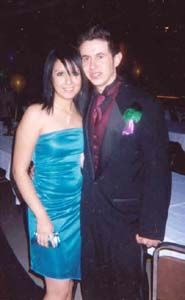just a lil' bit...
Prom nite i must say was pretty fun, yeah i'm glad i went :)
well i'll be graduating soon, & it sucks that all my friends from
Ysleta can't be there because their graduation is the same day,
but oh well, anyone who would like to go is invited. Nothing much
has been going on lately, i hope everyones happy & doing good.

( Read more... )
well i'll be graduating soon, & it sucks that all my friends from
Ysleta can't be there because their graduation is the same day,
but oh well, anyone who would like to go is invited. Nothing much
has been going on lately, i hope everyones happy & doing good.

( Read more... )
Vietnam war!
The Vietnam was a big war of so many things happeniong and going on.
Communist activist Ho Chi Minh secretly returns to Vietnam after 30 years in exile and organizes a nationalist organization known as the Viet Minh . After Japanese troops occupy Vietnam during World War II, the U.S. military intelligence agency Office of Strategic Services, allies with Ho Chi Minh and his Viet Minh guerrillas to harass Japanese troops in the jungles and to help rescue downed American pilots.
Amid rumors of a possible American invasion, Japanese oust the French colonial government which had been operating independently and seize control of Vietnam, installing Bao Dai as their puppet ruler. Severe famine strikes Hanoi and surrounding areas eventually resulting in two million deaths from starvation out of a population of ten million. The famine generates political unrest and peasant revolts against the Japanese and remnants of French colonial society. Ho Chi Minh capitalizes on the turmoil by successfully spreading his Viet Minh movement. Following the defeat of Nazi Germany, World War II Allies including the U.S., Britain, and Soviet Union, hold the Potsdam Conference in Germany to plan the post-war world. Vietnam is considered a minor item on the agenda. In order to disarm the Japanese in Vietnam, the Allies divide the country in half at the 16th parallel. Chinese Nationalists will move in and disarm the Japanese north of the parallel while the British will move in and do the same in the south. During the conference, representatives from France request the return of all French pre-war colonies in Southeast Asia. Their request is granted. Vietnam, Laos and Cambodia will once again become French colonies following the removal of the Japanese. A lot of different kind of things happened, also like. Japanese sign the surrender agreement in Tokyo Bay formally ending World War II in the Pacific. On this same day, Ho Chi Minh proclaims the independence of Vietnam by quoting from the text of the American Declaration of Independence which had been supplied to him by the OSS -- "We hold the truth that all men are created equal, that they are endowed by their Creator with certain unalienable rights, among them life, liberty and the pursuit of happiness. This immortal statement is extracted from the Declaration of Independence of the United States of America in 1776. These are undeniable truths." Ho declares himself president of the Democratic Republic of Vietnam and pursues American recognition but is repeatedly ignored by President Harry Truman. After a series of violent clashes with Viet Minh, French forces bombard Haiphong harbor and occupy Hanoi, forcing Ho Chi Minh and his Viet Minh forces to retreat into the jungle. In Hanoi, 30,000 Viet Minh launch their first large-scale attack against the French. Thus begins an eight year struggle known as the First Indochina War. "The resistance will be long and arduous, but our cause is just and we will surely triumph," declares Viet Minh military commander Vo Nguyen Giap. "If these [people] want a fight, they'll get it," French military commander Gen. Etrienne Valluy states. Skipping through some of the things. Outnumbering the French nearly five-to-one, 50,000 Viet Minh under Gen. Giap begin their assault against the fortified hills protecting the Dien Bien Phu air base.
Reply
Reply
Leave a comment